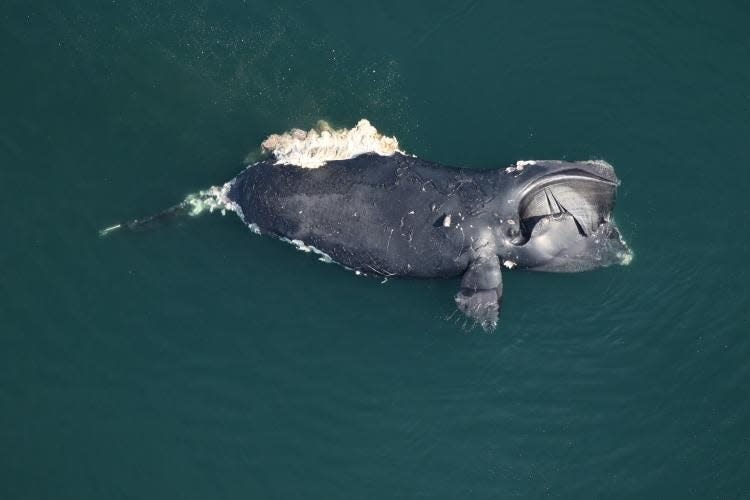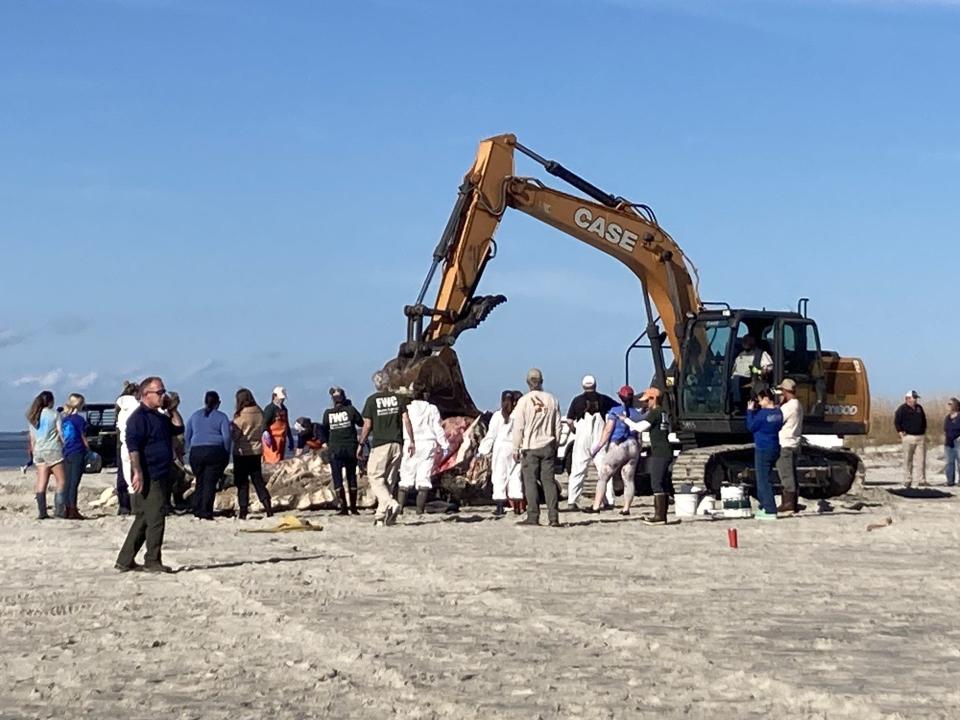Many ships off Georgia, Carolinas exceed whale-protection speed limits, data show

Nearly half of commercial container and bulk vessels operating off the coasts of Georgia and the Carolinas – including ships using the ports of Savannah and Brunswick – are exceeding seasonal speed limits created to protect the endangered North Atlantic right whale.
Those are the findings of the non-profit Whale Safe and other organizations that analyzed boat-traffic data in zones established by the National Oceanic and Atmospheric Agency Fisheries division, including the Mid-Atlantic Seasonal Management Area off Georgia and the Carolinas.
Ships serving the ports of Charleston, South Carolina, and Wilmington, North Carolina, also navigate the Mid-Atlantic zone.
Current federal regulations set a maximum of 10 knots (11.5 mph) from mid-November to mid-June for vessels at least 65 feet long in sections of the Atlantic Ocean from Florida to New England, where right whales are typically found during birthing season.
The report doesn’t break down the data by individual port but, rather, offers a snapshot of compliance in designated areas.
In the Mid-Atlantic Seasonal Management Area, container vessels and those carrying bulk cargo like grain account for two-thirds of all ship traffic. Combined, 53% of vessels in those categories have operated within the speed limit this year, the review found.
“We’ve already seen that asking ships to travel less than 10 knots where whales have been sighted can save these creatures’ lives, but not all ships are abiding by these limits.” said Douglas McCauley, director of the California-based Benioff Ocean Science Laboratory, one of the organizations involved in the assessment. “Thanks to a range of innovative technologies, we can now pinpoint speeding ships and provide data to help companies save whales.”
NOAA says it has assessed cival penalties of nearly $1 million in 56 cases involving vessels violating the speed limits in right whale speed zones in 2022 and 2023.
The agency also reports sending about 1,000 compliance letters to vessel owners along the Atlantic coast.
"Reacting in near-real time and using satellite-based technologies, we have sent more than 250 alerts to vessels operating in close proximity to right whales," the agency adds.
Herpetology history: Flights fuel Georgia's largest release of endangered sea turtles at Jekyll Island
'Ocean carriers can avoid endangered marine life'
While not tying vessels to individual ports, the analysis did tally compliance by shipping companies and assigned grades for each.
Two carriers whose ships are among the most-frequent users of the Port of Savannah, MSC Mediterranean Shipping Company and Maersk, were among the most complaint and earned B grades.
Across all protective zones, more than 69% of Maersk’s 56 vessels, which have covered 23,645 nautical miles in 2024, were within the limits while nearly 69% of 73 MSC vessels complied while traveling nearly 23,000 nautical miles, according to the organizations’ review.
MSC, the world’s largest container shipping company, said the protection of ocean life reflects its corporate culture.
“Ocean carriers can avoid endangered marine life without disruptions through proper coordination, planning and communication,” the company said in an emailed response to questions. “Additionally, we collaborate closely with the National Oceanic and Atmospheric Administration, environmental experts and local stakeholders, all of whom play a vital role in our success. We have also established best practices through hands-on training and education to ensure company-wide awareness and implementation.”

Species on the edge
Female right whales travel as much as 1,000 miles from Canada and New England to give birth and nurse calves in the warm Atlantic waters between Cape Fear, North Carolina, and Cape Canaveral, Florida, according to NOAA.
At least three right whales have died from vessel strikes so far this season, including two discovered off the coast of Georgia.
NOAA has reported at least 41 right whale fatalities since 2017. There are believed to be about 340 remaining, including fewer than 70 reproducing females.
A shark-scavenged right whale carcass discovered off the coast of Virginia in late March underscored the urgency of advocates’ efforts to protect the species. In that case, the death involved a female that had been spotted with a calf in January near St. Simons Island.
The young whale was not found and is presumed to have died.
At least 41 right whale fatalities have been reported since 2017, according to NOAA.
The Atlantic teemed with as many as 21,000 right whales before their population was decimated by commercial whaling in the late 19th century, driving their numbers down to an estimated 100.
John Deem covers climate change and the environment in coastal Georgia. He can be reached at jdeem@gannett.com
This article originally appeared on Savannah Morning News: Ships off Georgia,Carolinas flout right whale-protection speed limits

